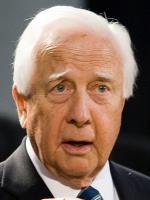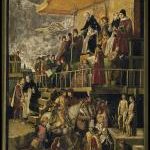 David McCullough was on The Daily Show Monday night. Earlier this year, he wrote, The Wright Brothers. He was a last minute replacement for Ted Cruz who suddenly found out there were some kittens that he needed to drown. And McCullough was certainly better than listening to Ted Cruz spit out a stream of talking points about how Mexicans are destroying America and the Iran deal is the worst foreign policy ever known to man — Neville Chamberlain blah, blah, blah. But that hardly means the segment was good. I wanted to retch.
David McCullough was on The Daily Show Monday night. Earlier this year, he wrote, The Wright Brothers. He was a last minute replacement for Ted Cruz who suddenly found out there were some kittens that he needed to drown. And McCullough was certainly better than listening to Ted Cruz spit out a stream of talking points about how Mexicans are destroying America and the Iran deal is the worst foreign policy ever known to man — Neville Chamberlain blah, blah, blah. But that hardly means the segment was good. I wanted to retch.
Stewart started off by noting that we don’t know that much about the Wright brothers — just what we learned on the children’s place mats we got at family restaurants. So here comes McCullough to tell us about the real Wright brothers — to give us just a taste of his 336 pages of wisdom on the subject. The man will dispel the myth and create instead a real story of these men — not the children’s book narrative of the rugged individuals or the Romantic heroes. But that was not to be.
This is how he begins to “enlighten” us on the true nature of the Wright brothers:
And he continues on in the same vein. He finally gets around to telling the story of the Wright’s 82 year old father who goes flying for the first time, “Orville took him up… And the whole time he was sitting beside Orville on this plane — no seat belts or anything… He kept saying, ‘Higher, Orville! Higher!’ That was the spirit of the family.” There’s a word for this: pathetic.
I don’t have a problem with hagiography. People like to make heroes out of humans. I’m fine with that. But don’t give me this garbage about telling the real story of the Wright brothers and then just provide the same old story with ever more hero worship. Back in 1968, The Archie Show produced an episode about the Wright brothers that contained more information about the subject — and a song!
As the voice of so many Ken Burns documentaries, David McCullough sort of speaks to a quaint Americana. But he also presents himself as a serious historian — complaining about the state of education. But the kind of history that he peddles is not what I recognize as history. It is more or less apologetics — the “We’re number one!” argument presented quietly, seriously, eloquently — but with no more cogency.






The man knows how to pick the dullest, safest, most NYT bestseller-guaranteed subjects. It’s a gift, no doubt about it! If his kids are smart, they’ll keep writing the same schlock after Dad moves on to the higher astral plane. So fifty years from now we’ll have McCullough’s “Scott Walker: The Man Who Took Orders Really Well.”
I was shocked when he came out with 1776 — because, you know, George Washington is such an uncovered object for historians. It reminds me of something that Jim Hogshire said to me when I was just starting out. I had said that I had an idea for a book but there were others on the same subject. He said, “It’s actually a lot harder to get a book published if it is totally new.” But you are doubtless right that McCullough allows readers to think they are reading “History!” without having to worry that they will be challenged.
Thanks for the linky love.
You write “But don’t give me this garbage about telling the real story of the Wright brothers and then just provide the same old story with ever more hero worship.” But that’s McCullough’s exact formula, and he’s done very well for himself by it! James Fillmore above has it exactly right–it’s the “dullest, safest” way to peddle history to the rubes.
No problem. I really like your site. And I was surprised that more people hadn’t taken on McCullough. Your article was the best I found. Plus you have really good commenters.
I think “History for Rubes” would make a great series! Simon & Schuster ought to jump on that.
Boy those were some good commenters! My favorite was John who pointed out that while Americans can’t name all 13 original colonies, there’s a huge number who have crazed religious-based scientific ignorance. Somehow the people bemoaning “our lack of history” always forget to mention that.
It’s just like Loewen points out (and I’m sure others as well): the official sanctified version of our history is so colossally boring, no wonder nobody cares about it. “Wright and Edison were hard working, you should work hard, too.” Shut up.
The other day some people in front of my building (it’s a poor building; I’m poor) were talking about the Iran deal and how “Reagan sold nukes to all those countries in the first place.” Wrong, but in essence a lot closer to the truth than what our future American hagiographers would say!
Incidentally I can never remember the 13 colonies either. I always get tripped up on stuff like Delaware. Delaware, pfft. We should sell it back to Britain already.
Until about last week, I had thought Vermont was one of the colonies. Yeah, history as presented is pretty. That’s why people like the musical 1776 — because it made the founding fathers more like real people. It was still largely a whitewash, but it doesn’t have to be all that good to be better than what usually passes for history.